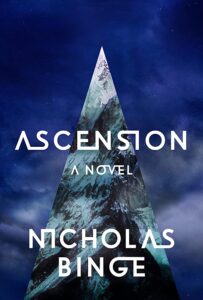A desolate moor, haunted by incomprehensible supernatural beings. Chains rattling in a dark castle, ghosts prowling the ramparts. A grisly corpse, hands chopped off and tongue sliced out. For any horror-lovers, whether the Gothic classics or the contemporary greats, these tropes will ring familiar.
They come, of course, from Shakespeare.
In fact, after more than a decade of teaching his work, I’ve come to see Shakespeare—at least when he’s writing tragedies—as primarily a horror writer. He might perhaps be the most significant influence in the entire English language to the Gothic, and consequently the modern, horror tradition.
On the surface, no play epitomizes this more than his first tragedy, the grisly Titus Andronicus. It is the Saw franchise of Elizabethan theatre, filled with as much shock and gore as Shakespeare could possibly have packed into a single play. As well as a full complement of stabbings, hangings, and beheadings, the audience is treated to Aaron being buried up to his neck until he starves to death, seeing Lavinia’s hands removed and tongue cut out, watching on as Alarbus’s arms and legs are cut off and he is thrown into a fire, and finally, Shakespeare delivers the coup-de-grace as Chiron and Demetrius are baked into a pie and then fed to their mother. Let it not be said that gore is a new thing in popular entertainment.
And yet, for all these horrors, this play never quite captures an audience (or a classroom) like some of his later, less graphic, tragedies. Why is that? Seen through the lens of a horror writer, Shakespeare’s progression as an artist is not just in his ability to play with structure, form, and character, but rather that he gains a deeper understanding of how to really scare people. As he grew as a writer, he learned there are better ways to emotionally wound an audience than the surface kills and thrills, and it’s this that ends up really defining him as a playwright.
Consider Macbeth, the famous Scottish play, so feared that actors are cautious not to say its name aloud. Yes, it has many of the tropes that would later go on to inspire Gothic horror: witches, ghosts, desolate landscapes, ancient castles. But the real horror of the play lies within the characters. We are forced to watch on as Macbeth, by all accounts a noble and loyal warrior at the start, loses his identity, his morals, and with them, his sanity.
After years of teaching the play, it is the loss of self that really serves to terrify: witnessing (and believing) the slow disintegration of a confident man into a screaming, gibbering, murderous mess. In Act 3, Scene 2, Macbeth pitifully howls “O full of scorpions is my mind!”; an image that has struck a chord with both me and my students every time I teach it. That your own mind is not to be trusted, filled with poisonous stingers that might jab you at any instant, unsettles in a way that a good beheading never quite can.
Real horror doesn’t live under the bed, in the dark cupboard, or on a desolate Scottish moor. It lives in the people we think we love and trust.
His wife suffers a similar downfall, though hers is even more pronounced. She famously rejects her femininity in favor of the darkness inside of her, asking spirits to “unsex me here” and “fill me from the crown to the toe top-full of direst cruelty.” Because of this, Lady Macbeth has become one of the great villains of Shakespearean theatre. But what I’ve learned over the years is that it is not her cruelty that really conjures up horror, but her vulnerability.
It is the details Shakespeare writes into the margins—the hint at her infant child who died before the play began, leading to the guilt she feels at the murder of Macduff’s children. The scariest moment is not Lady Macbeth calling upon invisible spirits. It’s her frantically washing the blood from her hands, trying to deal with the darkness she earlier embraced—but she cannot because that darkness is inside her now. It has taken root in her soul and it will not ever let her go.
It’s easy to see Macbeth as a horror. It’s got all the right vibes. What’s interesting is Shakespeare’s undimmed ability to horrify in less obviously horrific settings. My favorite tragedy, Othello, is a perfect example. It is a play about many things: about race and insecurity, about love and jealousy and faith, but most of all it is a play about trust. It constantly asks its characters: when faced with uncertainty, who do you believe and who do you doubt? Where do you place your trust? We see the same in modern horror. Trust is the central tension throughout John Carpenter’s classic The Thing, and is an underlying feature of many recent works from Sylvia Moreno-Garcia’s wonderful Mexican Gothic to Hiron Ennes’ horror masterpiece Leech.
Shakespeare takes this a step further, and rather than allowing us to ask these questions, he answers them for us. In Othello, we are forced to watch on as we know exactly who to trust and who not to, even as the characters themselves make the wrong choices. The villain of the piece, Iago, is a man everyone on stage trusts, and he delights in his villainous asides to the powerless audience, where he tells us exactly what he’s going to do to the trusting cast.
We are confidantes to the unravelling of the play. Iago feels no guilt, but we are made to feel it on his behalf. It’s a genius trick, so powerful that an actor in the 19th century playing Iago was shot by an enraged audience member halfway through his performance. It underscores for me one of the most important and counter-intuitive lessons in horror: it’s so much worse when we know what’s coming, but must watch anyway. It’s like watching a car crash in slow motion and there’s nothing we can do to stop it.
The play as a whole becomes deeply claustrophobic. The setting tightens in, from the world-stage, to Cyprus, to a single castle and eventually just Othello’s marital bed. As it does, Othello himself, much like Macbeth, loses sight of everything that he once held to be true. He ends up in such a furious seething madness he can barely talk, let alone think. It’s terrifying to watch and his final smothering of Desdemona is one of the most horrific scenes in all Shakespeare—worse than anything in Titus—because of the intensity of his internal struggle. We can see just how deeply the character hates himself, as his final suicide confirms, and there’s something in that vulnerability that speaks to the fears that live deep in our souls.
These considerations run deep in my mind when I write. My novel Ascension, which is out in late April, is a condensation of many of these ideas. Ascension is an eclectic blend that runs the full gamut of genre fiction: it is sci-fi, it is thriller, it is fantasy. But most of all, it is a love-letter to great horror, and for that, I looked to Shakespeare. So yes, in it, you will find the shocking deaths that enthralled audiences of Titus Andronicus—there are stabbings and suicides and beheadings.
You’ll find the desolate landscapes and whispering mysteries of Macbeth, as well. But for me, that’s window-dressing. Where the book comes alive is in the claustrophobic self-loathing of Othello. It’s in the seething madness of Macbeth and in the dark and roiling guilt that bubbles inside his wife. Most of all, it’s in the grand tragedy of watching everything go very, very wrong and being utterly powerless to stop it.
If my many years of teaching Shakespeare taught me anything, it’s that that real horror doesn’t live under the bed, in the dark cupboard, or on a desolate Scottish moor. It lives in the people we think we love and trust. It thrives in our desires, our doubts, our self-justifications.
It is born in the deepest recesses of our hearts.
_____________________________
Ascension, by Nicholas Binge, is available now from Riverhead.

